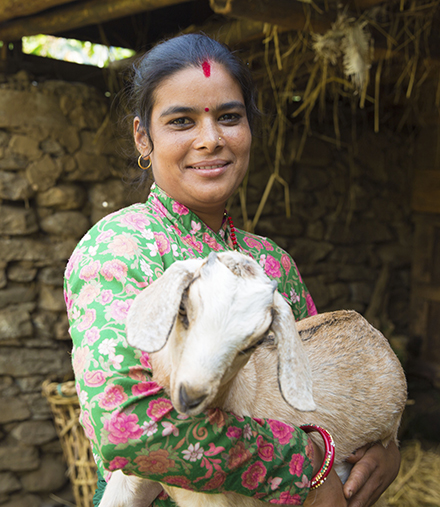On June 19, 2014, Oxfam International and Clean Energy Nepal honored 22 women farmers for were recognized for their contributions to agriculture in Nepal through the Recognition to Women Farmers program. Heifer project participant Mithu Adhikari, from Kaski district’s Lahachowk village, was one of them. Mithu was praised for her successful commercial vegetable farming activities.
A couple of years ago, Mithu and her husband were struggling to provide for their family. Her husband decided to leave home to pursue employment as a construction worker, leaving Mithu to raise their two sons. Despite his new job, the family still did not have enough income to meet their needs.
In February 2009, Heifer Nepal implemented the Sustainable Community Development project in Kaski district. The project sought to improve the nutritional status of participants through gender-focused and socially just programs. Women farmers became part of self-help groups and were provided livestock, such as goats and dairy cattle, as well as seeds and saplings to grow vegetables and fruit. They completed capacity building trainings, which included topics like Heifer’s 12 Cornerstones for Just and Sustainable Development and improved animal management.
Mithu received one nanny goat through the project, and after a few short months she began making a profit from it. With her new income, Mithu decided to increase the size of her farm.

Mithu’s group, the Pratibha Social Entrepreneur Women’s Cooperative, was registered in 2012. The cooperative offered farmers easy access to loans at affordable interest rates. Mithu borrowed $1,000 at 16 percent interest and reinvested the profit from her goats to start a vegetable farm.
She leased a quarter-acre plot of land and started growing tomatoes in high tunnels. High tunnels are structures that cover crops. The cover provides plants with solar heat during the day and protects them from cold temperatures. This extends the growing season for certain crops, like Mithu’s tomatoes, which translates to extra money for her family.
Mithu increased the size of her farm to almost a full acre and has added cauliflower, cabbage and other vegetables. She also raises dairy cattle, a female goat, and poultry. Mithu’s farm brings in about $500 a month.
Sometimes Mithu hires help during peak vegetable seasons, but for the most part she manages the entire farm on her own. Visitors come by every day to look at her farm and learn from her experiences.
“Some of them congratulate me for my success and some thank me for inspiring them to do something on their own,” Mithu says. “Their feedback fills me up with joy and motivation.”
Thanks tothe increase in income, Mithu was able to send her two sons to school and build a new house for her family. This financial empowerment has improved Mithu’s confidence. In the future, she plans to expand her farm and provide year-round employment opportunities. Due to of the farm’s success, Mithu’s husband is planning his return home so that he can provide full-time help with the farm and be present for his wife and growing children.
There is no vegetable collection center in her village, so Mithu delivers the vegetables to the closest market in Pokhara, which is about 12 miles from her house. The cooperative will soon be operating its own collection center in the village, saving time for farmers like Mithu. The cooperative provides farmers in Lahachowk village the opportunity to sell produce for a better price.
Today, Mithu is an active member of her community, to which she makes great contributions through her participation in the Village Welfare Fund, small farmers group, and the Pratibha Social Entrepreneur Women’s Cooperative. Thanks to Heifer, Mithu was able to turn what she learned into a profitable enterprise. Although she received trainings and a goat, Mithu took matters into her own hands to change the course of her family’s future, and that is the mark of a model farmer.
Empower a woman in Nepal and change the world.
Story by Alina Karki, Planning, Monitoring and Evaluation Temp, Heifer Nepal
Photo by Lacey West, Video Producer, Heifer International